 Estos días me gustan porque tienen más anaranjado que de costumbre, el sol ya no brilla demasiado y el viento es fresco, por eso me gustan estos días. También me gustan porque uno puede comer todo el pan de muerto que quiera, y el pan de muerto es muy rico. En mi casa suelen poner un altar y llenarlo de fotos de los familiares que ya murieron, supongo que este año se pondrá una o dos fotos de Canelo. Esto no me da alegría, y todavía estoy triste.
Estos días me gustan porque tienen más anaranjado que de costumbre, el sol ya no brilla demasiado y el viento es fresco, por eso me gustan estos días. También me gustan porque uno puede comer todo el pan de muerto que quiera, y el pan de muerto es muy rico. En mi casa suelen poner un altar y llenarlo de fotos de los familiares que ya murieron, supongo que este año se pondrá una o dos fotos de Canelo. Esto no me da alegría, y todavía estoy triste.Monday, October 30, 2006
Blue in Green, by Miles Davis
 Estos días me gustan porque tienen más anaranjado que de costumbre, el sol ya no brilla demasiado y el viento es fresco, por eso me gustan estos días. También me gustan porque uno puede comer todo el pan de muerto que quiera, y el pan de muerto es muy rico. En mi casa suelen poner un altar y llenarlo de fotos de los familiares que ya murieron, supongo que este año se pondrá una o dos fotos de Canelo. Esto no me da alegría, y todavía estoy triste.
Estos días me gustan porque tienen más anaranjado que de costumbre, el sol ya no brilla demasiado y el viento es fresco, por eso me gustan estos días. También me gustan porque uno puede comer todo el pan de muerto que quiera, y el pan de muerto es muy rico. En mi casa suelen poner un altar y llenarlo de fotos de los familiares que ya murieron, supongo que este año se pondrá una o dos fotos de Canelo. Esto no me da alegría, y todavía estoy triste.Friday, October 27, 2006
Si Hoy, by Entre Rios
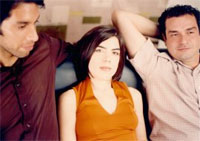
Today I woke up thinking, "si hoy..."
I think this is the first song in Spanish to be played at these bars. Maybe this won't make many of their frequent costumers very happy, but since I'm the official resident DJ I think I can get away with it. Come on, pour yourselves a whiskey and listen to it.
I have been thinking about how some pop songs can actually become "more than the sum of their parts", as a writer we have been rereading a lot recently would say, and I think that's the case of Si Hoy. The music of Entre Ríos, with Isol singing, has always managed to dig deep inside of me, in spite of my dislike for pop music sung in español. This may be the first band from Latin America I openly accept liking, and liking a lot. This song, with its slow, minimal soundscape that keeps the tempo with a vinyl record-like scratch, and its electric early birds singing in the background, makes of verbs nouns, dismounts grammar to make language say what it would only say under unusual -not to say painful- circumstances. The Music of Entre Ríos, their lyrics and their sounds, tend to have the coldness and the intimate, difficult feeling of mornings. And mournings. Because mornings are the interruption of sleep -perchance dreams, maybe nightmares- and mourning an interruption of normality, of the daily intercourse of life, their music is also fragmentary, prone to interruptions, breakbeats, syncopations, deep heart-beats and obscure implications. Grammar and vocabulary, spelling and "orthography" (orthos, correct; straight) are twisted, torn, crunched and language (music, linguistics, pop lyricism) becomes something else. Isol's voice can make a rose become a rough verb, to graze, to rub. An infinitive verb will be rhetorically substituted by a noun, a temporal deictic, and meanings will flow in different directions. Entre Ríos used to make music for those who always end up missing someone-something-somewhere, for those who wake up, suddenly, thinking,
"Así todos los días
me dejarás de ayer,
que hoy no dirás: 'estoy extraño entre las paredes',
mi cielo de contraluz.
Destrozado ir dentro
de este lado que no rosa,
acostado donde cantan las espinas que ahora duelen.
Thursday, October 26, 2006
Gave You, by Bonnie 'Prince' Billy & Matt Sweeney

It's been too long, chasing you, having you, losing you once more. Our stupid pride has made a gash in our trust and now I'm ranting all by myself about our meaning-to-be.
You came and told me you wanted to be here, that it was your toothbrush that deserved a place in my sink, that it was you in my bed, that I needed. You undressed and let me in you, and I was alive again.
And then you left, and I was left with nothing, asking Why. I'm hurt and I'm broken. It's been too long and I'm stretched beyond repair.
Sunday, October 22, 2006
Holes, by Mercury Rev
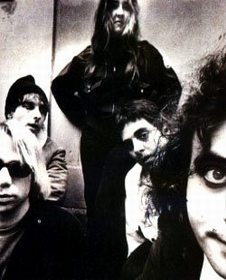
"I try not to believe in God, of course, but sometimes things happen in music, in songs, that bring me up short, make me do a double-take. When things add up to more than the sum of their parts, when the effects achieved are inexplicable, then atheists like me start to get into difficult territory."
-Nick Hornby, in 31 Songs
Nick Hornby wrote those words about Rufus Wainwright (a man I think, too, has had some kind of contract with a superior being, even though I also try not to believe in God, because God in my religion, tends to be an Old Testament cruel and blood-thirsty bastard), but when I read him I thought about Mercury Rev's Holes. I listened to it for the first time watching the painfully beautiful Panic, a film that left me cold for hours after having watched it, one of those films that leave you wondering about the divine-like role of individual creators -such as filmmakers and musicians- and their ability to make us question the very core of our existence. The intro itself, full of friendly ghosts, is both funny and terrible; misterious and full of that kind of light you get to see in places like upstate New York in the winter or England in the autumn, when the dense clouds get pierced by shy but powerful light blades. And the whole vibe of the intro is repeated throughout the whole song, only to be made more evident by the drums and the guitar, that in this case redefine the possibilities of what a ballad is able to achieve. (One listens to this song, especially in its live interpretations, and wonders why things like Coldplay's Yellow can be so popular, when there are such truly beautiful pop artifacts such as Holes out there). It is not easy to know what Holes is about: the passage of time, the meaning of dreams, the remembrance of an hallucination, the translation of what the heart feels after/during a breakup, the tragic essence of human finiteness, our fleeting passing through this world, but also, importantly, as all great bands do in their great songs, about the very nature of rock and roll, a self-reflexive interrogation of what a band is, or the rock and roll band as a metaphor for human existence, for the performance that life is. For me, this song speaks to me in ways I cannot properly define, but all I know is that deep down I know this song is a love song, an attempt at grabbing all that which is solid but melts into the air; in some strange way an interpretation of what the "ineffable" is, which is to say what the divine is: "distant gods/and faded signs". We will all die, like flies, seemingly unstoppable, so fast we can't really see their transparent wings move, miniscule yet ubiquitous. Like flies, we are just small creatures controlled by time, an expression of what is uncontrollable and therefore ineffable. "All those endless ends/that can't be tied": Mercury Rev have composed in Holes a celebration of the void, of emptiness, of absolute darkness, of the blank spaces that separate intention and outcome, the painful awareness of our inability to decide completely our futile destinies. An anthem celebrating impossibility, then, "those funny little plans/that never work quite right", like love itself, that we can never really control. And yet we plan, and dream, and think it possible: to last, to fulfill our dreams, to love, finally, and to be loved, until the end. Only to find out that whether it happens or not is not really up to us.
The whole lyrics can be read here.
There's an annoying lack of synchronicity between video and sound, and unfortunately the whole haunted intro of the original is lost, but it's the only version I found at You Tube:
Sunday, October 15, 2006
Shadow of a Doubt, by Sonic Youth
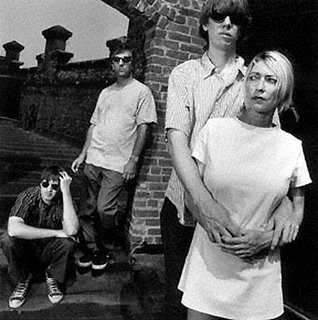
Some songs will be in repeated playback in the dancefloor of my memory for the rest of my life. Shadow of a Doubt is one of those: it is more than a landmark; it is a milestone, a song that comes back to me when I least expect it, just when I thought that enough time had passed it comes up to the fore once again, the volume cranked up, to tell me new things about the old days and old things about the present. This song loops like a dream: it is, indeed, a surreal soundscape, an in crescendo hallucination. Kim's whispering penetrates your ears and brain like the voice of your unconscious: it grows, becomes something else, elevates itself as it gets deeper. Whispering becomes yelling, and the meditative, repetitive motif explodes in waves of ecstasy, like a wet dream, when one knows one is dreaming but is unable -and sometimes unwilling- to wake up. Not only a song to make love with, but a song that makes love to you as well, a passionate aesthetic artifact that makes the word 'psychedelia" seem very limited. Shadow of a Doubt deals with fate, regret, the tragic essence of love, the nakedness of our needs and desires, the uncanny nature of dreams, the crave for a kiss when nothing is certain and everything seems dark. Its possibilities are endless, like the infinite interpretations of a recurrent dream.
Friday, October 13, 2006
Satellite of love, by Lou Reed
 No recuerdo bien cuando fue la primera vez que escuché su lanzamiento, fue en algún momento de entre las 10 y las 12, algún lunes, martes o miércoles, no lo sé, pero desde ese día la percepción que tengo de esta canción es diferente. El programa era de Jordi Soler; creo que ha sido el programa de radio que mas he disfrutado, no me lo perdía. Era diferente a los demás, hacía cosas, decía cosas y ponía canciones, como esta.
No recuerdo bien cuando fue la primera vez que escuché su lanzamiento, fue en algún momento de entre las 10 y las 12, algún lunes, martes o miércoles, no lo sé, pero desde ese día la percepción que tengo de esta canción es diferente. El programa era de Jordi Soler; creo que ha sido el programa de radio que mas he disfrutado, no me lo perdía. Era diferente a los demás, hacía cosas, decía cosas y ponía canciones, como esta. Creo que la primera vez que lanzó el satélite del amor fue cuando se levanto el EZLN, después cada semana lo lanzaba por algo nuevo, hasta que, como nada se solucionaba, lo guardó. Tiempo después Jordi se fue y el programa se acabó.
No pienso que sea la mejor canción del Transformer; una de las grandes influencias al Bowie de la época; alguna vez escuché que participó en la nueva versión de Satellite of love, esa que ponía el señor Soler en su programa.
El satélite del amor no ha sido lanzado en mucho tiempo. En estos días creo que necesitaríamos una estación repitiendo una y otra vez:
Satellites gone
Up to the skies
Thing like that drive me
Out of my mind.
O simplemente algún programa como ese de los lunes, martes y miércoles, de
Powered by Castpost
Friday, October 06, 2006
Friday I'm in Love, by the Cure
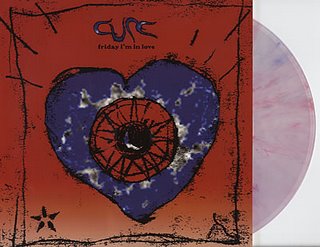
Oh, how we despised this song. It came out and it was for us the end of it all. "The Cure going happy", the Goths shrieked in shock, overlooking the history of the band and unable to see beyond Disintegration's quite profitable miserabilism. Because, we would understand, this song is, first of all, what you would call a perfect pop single: it is not only accesible and catchy, but also, like all good singles, it sums up a band's sound. In one way, with time's distance on my side, I can say this was The Cure at their commercial best. The look that would influence millions all over the world, the childish simplicity combined with the queerest masquerade. All great poets go back to nursery rhymes at one stage or another (think of Auden, for example) and this is Smith's most clear attempt to become widely mainstream by going back to the simplest structures. Porl Thompson's creative multitasking for the band -guitar, sax, keyboards, album artwork- summarized in his trademark crouching came to a high point in this single from their higher-charting album of their career. There was no way a song like, say, The Drowning Man would achieve, commercially, what this song did. "This is why I hate you," hardcore Cure fans said at the time. But, fourteen years -fourteen!- later, one has to accept his guilty pleasures and realize that there are days that, unavoidably, make us feel in a Friday I'm in Love mood. Boy, am I getting old...
Thursday, October 05, 2006
At The River, by Groove Armada

Every once in a while there's a song me and my friends take as a hymn. In the old days of 99-00, Groove Armada was sounding hard with "I See You Baby" and "If Everybody Looked The Same". Somebody (I can't recall exactly who, but most likely it was Rafa) bought the record and in a party this song began to sound. It was near the death of the party, so there probably must have been 3 or 4 people hanging around. I won't say that I fell for it immediatly. I actually hated it. But Rafa kept on telling me: "You'll see that one day Groove Armada will shock the world" (as I've said before he tends to overreact, like when he said that Blind Melon could have been the new Beatles). It never happened. Yes, Groove Armada delivered great records later like Lovebox, but they never caused a revolution. Little by little I began liking this song. There was a point in which I heard it two or three times in a row. Then I couldn't hear it anymore. The other day I was at Rafa's place and "At The River" began. It came back to me. Those days of drinking and smoking as if the world would never end.
Watch the video here
Get Me, by Dinosaur Jr

Four Spin magazine covers decorate the yellowish walls of my memory: one read 'Do you believe in Pixies?', the second said 'Grunge is Dead', the third featured the classic black-and-white photo of Kurt Cobain, the fourth one said, bombastically: 'J Mascis is God'. For those of us who had never thought that Eric Clapton was a deity, the remark sounded exaggerated but almost true. This was the mid nineties. My hair would get on my face all the time and the wind will make it go into knots impossible to untie. Once, a girlfriend noticed my hair reached my navel. And this was the sound of mornings for me. A song I recorded once and again on chrome tapes. No discmans nor i-Pods back then, but walkmans. Leave home at six thirty to make it to school at 7, and listen to J Mascis spread the word. His voice and his guitar were an unity that represented in several ways the way I used to feel back then. The city was sountracked by his aching voice. If a guitar has ever cried it has been under J Mascis's spell. There was always something silly about the lyrics, the easy rhymes and all, but through fragments he left enough room for us Sub Pop losers to imagine emotional landscapes. It was what was between the sentences, the unconnected meanings in the almost inarticulate syntax of his lyricism. This was the sound of early-twenties passion, the soundscapes of urban mornings and late arrivals, waiting in the cold and being stood up, of waking up late or never sleeping. The sound of youth's restlessness and common-place post-teenage angst. And he was dead right: Every dream is shot by daylight...
Tuesday, October 03, 2006
Your Ghost, by Kristin Hersh
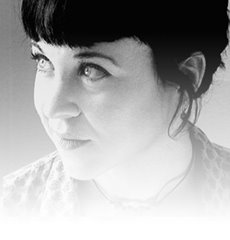
We would listen to it again and again. The description of restlessness: sleepwalking, the amplified sounds of night. The repetitive nature of a visitation: ghosts are real, are here. Walking among us. The clock, the phone, maybe water dripping. The sound of naked feet on the stairs. Staying awake, thinking of someone who is not here anymore. Some people just wake up hungry, can't sleep unless they eat. They hunt for easy preys in the kitchen in the wee hours. And then they hear steps, or voices. Others wake up hungry and make phone calls to empty houses. A song I used as a letter so many times, an alarm call, a testimony, an exorcism. You recognized his voice right away, Michael's achingly temperamental voice right there, behind her, like a supernatural dialogue. A spirit. This was a hymn for us, in many ways. How can someone we don't know pin down the feeling so well? How can one relate so much to someone else's craft? How can two voices, her Throwing Muse voice and his Georgian Starry Throat, a guitar and some strings -the ubiquitous Mr Martin McCarrick, (who we saw once play live in Mexico City next to Siouxsie and her Banshees many years ago, remember?) say so much, translate the presence of the spectre, invoke the melancholia felt when the ghost still drives in circles around us?
Sunday, October 01, 2006
Don't Let Me Be Misunderstood, as performed by The Animals
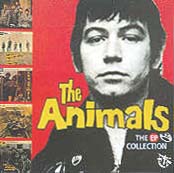
Because the blues are the root of it all, and because the blues, the mean blues, are the driving force behind essential creative efforts. Eric Burdon and his Animals get it straight here: music is a form of praying. One has to let them say it for us: the gap between intention and outcome (or interpretation) is bottomless. It's true, the song can also be used as a cheap excuse, an alibi for moral bullshit and infidelity. But all one can do is hope: please, believe me, trust in me: I'm just a soul whose intentions are good. But relationships are always contaminated, full of noise, unclear. Again, all we are left with is hope. Language is impossible to control, and so is the other's interpretation of ourselves. Oh lord, please don't let me be misunderstood...